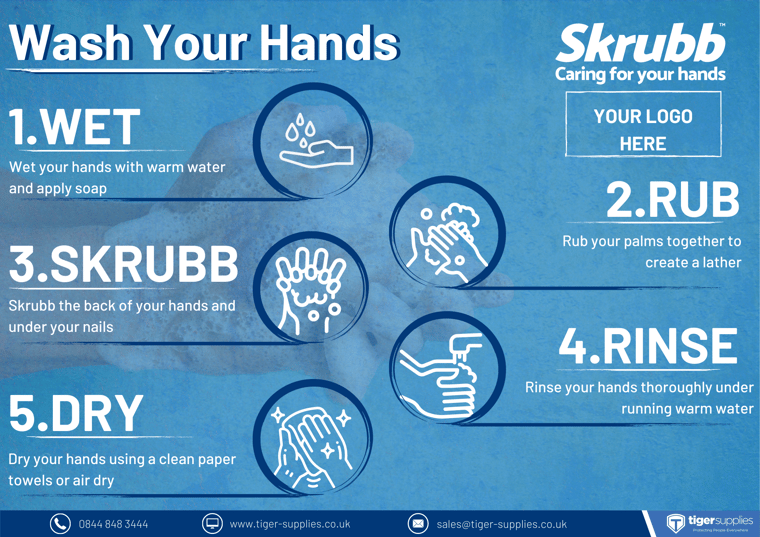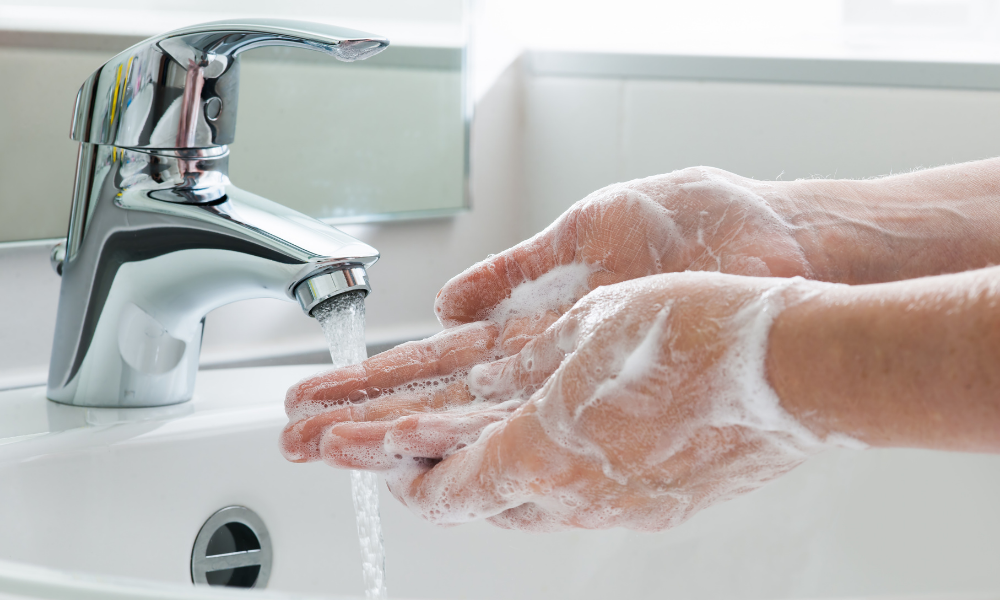Hand Hygiene: keep on SKRUBB-ing
Why hand hygiene is important
Keeping our hands clean is one of the most steps we can take to avoid spreading germs and bacteria around to others and surfaces we touch. On average, you will come into contact with 840,000 germs every 30 mins which can survive for up to three hours. People frequently touch their eyes, nose, and mouth without even realising it, which allows germs and other harmful bacteria can get into the body making you ill.
1 in 3 people don’t use soap when washing their hands. Washing your hands properly with soap and running water removes dirt, viruses and bacteria which is a vital step to avoid transmitting them to others, objects and surfaces you may touch. Germs and bacteria on your hands can spread illnesses, even if you’re not sick. This is now more crucial
due to the global pandemic COVID-19.
 How to wash your hands
How to wash your hands
SKUBBing your hands clean is easy, it takes around 20-30 seconds to do and is one of the best ways to prevent spreading germs from person to person. To know if washed your hands for at least 20 seconds, simply sing the happy birthday song twice
Hand sanitiser is a convenient on-the-go option to use when soap and running water aren’t readily available. Drying hands after washing is critical mainly because damp hands spread 1,000 times more bacteria than dry hands!

Click here to download our free hand-washing poster
You should wash your hands:
- Before and after preparing raw food like meat and vegetables.
- Before eating food.
- After coughing, sneezing or blowing your nose.
- After going outside and visiting public places i.e. your local grocery store.
- After using the toilet.



How can businesses encourage and improve hand hygiene in the workplace?
Encouraging staff to improve their hand hygiene can help reduce absenteeism by up to 13%. Time off due to sickness can be easily prevented with the correct hand washing technique, and those who use hand sanitiser are 67% less likely to fall ill.
As a company, you can place hand sanitiser stands or dispensers in high traffic areas to encourage better hand hygiene, these include building entrances, communal areas and toilets etc. Ask members of staff or visitors to use the hand sanitiser as soon as they walk inside the building and notify them where sanitiser stations are located.
Ensure that soap, sanitiser, clean paper towels and other cleaning products are readily available for staff and visitors to use especially in washroom facilities. Food preparation areas should have a designated sink, so employees can wash their hands before and after handling food. Posters can be displayed to remind people how to wash their hands effectively.
Promote clean hand hygiene culture
Teaching and promoting hand hygiene will help people stay healthy. Follow the simple steps below to ensure everyone at the workplace stays safe
- Encourage staff to cover up coughs and sneezes into their elbow, not by using their hands. Use sanitiser immediately after.
- Discourage staff from using their colleagues, phones, desks, work tools and any other equipment.
- Place posters in prominent positions around the workplace to encourage good hand hygiene.
- Provide antibacterial wipes or spray to employees so they can clean tools and equipment before and after use.
- Ensure all methods of communication are adapted so that everyone is included in the messaging.
- Select key employees to be ‘hand hygiene champions’ let them lead by example and provide help as and when needed.
- Train members of staff so that everyone understands what you are looking to achieve and the part they need to play to ensure colleagues and visitors safety and health.
Introducing workplace hand hygiene facilities will benefit the business as it will become a safer working environment for employees and provide reassurance that’s it’s safe to return to the office. Better facilities, encouraging hand hygiene among staff and further training may not only make employees feel safer at work but can also increase productivity as fewer people take sick leave.
Summary
Handwashing and sanitising is essential step to take to prevent the transmission of bad bacteria, virus and germs. This is especially important at the workplace where large numbers of people often assemble in close quarters.
People may spend most of their waking hours at work, increasing the risk of infectious exposure, not only from other workers but also from customers and clients. Promoting hand hygiene culture will minimise the risk and transmission of harmful germs and bacteria to others, which will make the workplace a safer environment for everyone
Check out our new SKRUBB range. All new soaps, sanitisers and restorative skin cream manufactured in the UK


